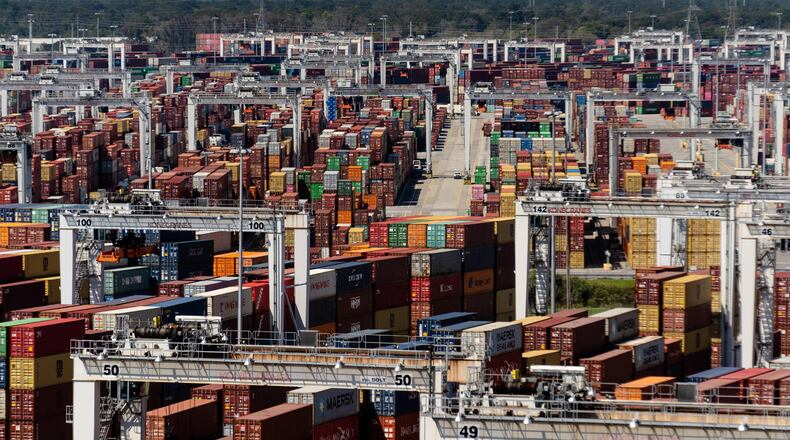With tens of thousands of containers stacking up on the grounds around Savannah’s massive port, officials are in talks with the federal government and railways in the hopes of taking the pressure off by adding four storage sites farther inland.
Two of the sites are in Georgia, one near Atlanta and one near Dalton, according to the Georgia Ports Authority.
With an agreement — which could include some federal money — the clog of containers at the port would be thinned and the cargo could wait for pick-up at places that are likely closer to its final destinations.
“I think we are weeks away for this, but we have the plan,” Griff Lynch, the executive director of the Georgia Ports Authority, said Wednesday.
White House officials on Tuesday said they were acting to enable 24-hour operations at the gigantic ports of Los Angeles and Long Beach. The announcement was a high-profile acknowledgement that the global snafu in supply chains is continuing to add time and cost to the world’s economy.
Government data released Wednesday showed a 0.4% increase last month in the consumer price index, with food and rents accounting for more than half of the jump. In the past 12 months, the CPI has climbed 5.4%.
The Port of Savannah has added nearly 400 workers in the past year, expanding its workforce to about 1,520, and is already working around the clock. The authority also has a number of huge projects underway that will add to its overall capacity.
But the backup is now. Between 20 and 25 ships are anchored offshore in a queue, unable to dock until other ships are unloaded.
The backlog in the water is not as much of an issue as what happens after cargo is unloaded. Many containers sit for weeks waiting to be carted away by retailers and various logistics companies — companies that are often struggling with a shortage of truckers.
“Our issue is a little different than on the (West) coast,” he said. “We are trying to get containers off the facility.”
Nearly 80,000 containers are stacked up, about 60% more than the pre-pandemic average, Lynch said.
With the holidays approaching, and consumer spending expected to be strong, the timeliness of delivery is a concern to retailers and consumers alike. But with increased capacity and time, most goods should be on shelves or under trees when they are supposed to be, Lynch said.
“We have polled our top customers and I am hearing there will be some spottiness, some items with a shortage, but mostly it looks OK,” he said. “I don’t think this is a no-Santa Claus Christmas.”
About the Author
Keep Reading
The Latest
Featured



